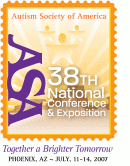 |
The ASA's 38th National Conference on Autism Spectrum Disorders (July 11-14, 2007) of ASAThe Westin Kierland Resort & Spa, Scottsdale, AZ |
| For a complete author index with session numbers, please click here | |
| Saturday, July 14, 2007: 12:30 PM-1:45 PM | |||
| Herberger Ballroom 3 | |||
| #2793- Social and Friendship Skills: What to Know, What to Do* | |||
| How do the features of autism spectrum disorders cause difficulty in learning to socialize and make friends? What are effective ways to help? This session provides essential explanations of the root causes of social difficulties in autism, Asperger Syndrome, and similar conditions. Attendees will learn key practical strategies to use everyday in diverse settings to support the development and generalization of relationships and friendships. Discussion includes the concept of social validity and the perspectives of siblings and peers. [Presented in English and/or Spanish]. | |||
| Presenter: | - Emily Iland is the mother of a son with autism, a leader in the autism field, and a professional autism consultant. She is the co-author and translator of Los Trastornos del Espectro de Autismo A-Z, winner of the Autism Society Outstanding Literary Work of 2006 and the International Latino Book Award. | ||
|
| |||
|
PLEASE NOTE: This proposal is for two presentations on this topic, a session in English and an identical Spanish-language session. I am submitting the descriptions in English, and will provide the equivalent information in Spanish if the presentation proposal is accepted for a Spanish session. Essential information about the root causes of social difficulties often experienced by persons with Autism Spectrum Disorders includes in-depth explanations and concrete examples of the social diagnostic criteria common to both Autism and Asperger Syndrome. Typical development of infants and small children is described briefly to contrast with the differences seen in Autism Spectrum Disorders and highlight areas of concern (consistent with warning signs in the CDC Know the Signs: Act Early Campaign). Discussion of features seen in typical development such as shared attention, shared enjoyment, nonverbal communication, social pacing, and social referencing help make sense of the differences in the behaviors and characteristics seen in people with ASD. The lack of imitative and imaginative play is contrasted with restricted and repetitive play seen in ASD and tied to the effects on socialization and communication. These can include the Matthew Effect (the rich get richer and the poor get poorer) due to less practice, how lack of flexibility and “shifting” can cause problems with peers, and the idea that restrictive interests or repetitive play can limit what those with ASD have in common with others, resulting in less to do and talk about together. Current scientific research on neurological differences such as findings about mirror neurons and face recognition are presented. The effects and implications of the developmental and neurological differences seen in ASD are discussed so that attendees understand not only why explicit instruction is needed, but what needs to be taught. Practical strategies help attendees recognize and define social difficulties more clearly and identify the skills that need to be taught. Personal, logical ways to teach are suggested that support incidental teaching and generalization. Three key strategies are presented. The first strategy includes examining a particular problematic situation to discover, “What is it that this person does not know that everyone else knows.” This includes recognizing “invisible rules” that exist throughout society and how to make them visible for the person with ASD. Identification of the difficulty, including the circumstances when it is problematic, helps attendees develop goals and ways to teach and generalize needed skills. The second technique is to relate an unknown idea or concept to the personal knowledge or interests of the person with ASD. Activation of prior knowledge is a key step in teaching and particularly relevant to stimulating the interest and understanding of persons with ASD. Research shows that shared mutual interests is the foundation for one of four types of friendships for everyone; the third social facilitation technique includes taking advantage of restrictive and repetitive interests to develop friendships and relationships based on mutual interests and individual talents. Similarly, the idea of contribution is explained as a way to support relationships and community belonging; this idea may be currently be under-appreciated but is an emerging research-based best practice (in press, Bubel Aiken Foundation/ University of Minnesota). The “who will help teach” part of the discussion includes the research-based concept that much of what children and young people with ASD need to know should be taught or supported by well informed age-peers. The role of siblings and support for their relationships with the person with ASD are explored. The essential concepts of peer validity and peer support are discussed (as integral to the model Yes I Can Program for Social Inclusion from the University of Minnesota Institute on Community Integration, in which the presenter has training and experience). Protection from victimization and helping people with ASD understand social limits is discussed and pertains both to the skills to learn and the role of the peers and others.
|
|||
See more of General Submissions
See more of The ASA's 38th National Conference on Autism Spectrum Disorders (July 11-14, 2007)